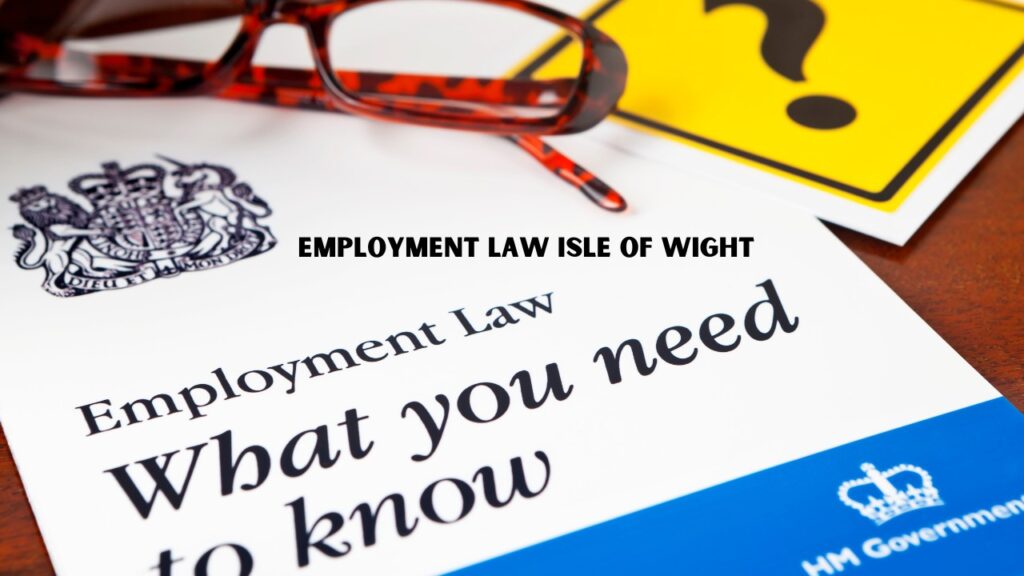Employment law is a crucial aspect of the legal landscape, governing the relationship between employers and employees. On the Isle of Wight, as in the rest of the UK, employment law covers a wide range of issues, from contracts and wages to discrimination and workplace safety. This article provides an in-depth look at employment law on the Isle of Wight, exploring its key components, the rights and responsibilities of both employers and employees, and the local resources available for legal support.
Overview of Employment Law
What Is Employment Law?
Employment law refers to the body of laws, regulations, and case law that govern the relationship between employers and employees. It includes a wide range of legal areas, such as:
- Contracts of Employment
- Wages and Working Hours
- Health and Safety Regulations
- Discrimination and Equal Opportunities
- Termination of Employment and Redundancy
Employment Law in the UK
Employment law in the UK is governed by both statute and common law. Statutory laws are enacted by Parliament, while common law is developed through judicial decisions. Key pieces of legislation include the Employment Rights Act 1996, the Equality Act 2010, and the Health and Safety at Work Act 1974. These laws apply uniformly across the UK, including the Isle of Wight.
Importance of Employment Law
Employment law is essential for ensuring fair treatment in the workplace. It protects employees from exploitation and discrimination, while also providing employers with a framework for managing their workforce effectively. On the Isle of Wight, employment law plays a vital role in supporting the local economy by fostering a fair and productive work environment.
Key Components of Employment Law on the Isle of Wight
Contracts of Employment
The Employment Contract
An employment contract is a legally binding agreement between an employer and an employee. It sets out the terms and conditions of employment, including job duties, working hours, salary, and benefits. On the Isle of Wight, as in the rest of the UK, employers are required to provide employees with a written statement of the main terms of employment within two months of starting work.
Types of Employment Contracts
There are several types of employment contracts commonly used on the Isle of Wight:
- Permanent Contracts: These contracts have no fixed end date and continue until either the employer or employee terminates the agreement.
- Fixed-Term Contracts: These contracts are for a specific duration or until the completion of a particular project. They end automatically when the term expires.
- Zero-Hours Contracts: These contracts do not guarantee any specific number of working hours, offering flexibility but also uncertainty for employees.
Breach of Contract
A breach of contract occurs when either party fails to fulfill their obligations under the employment contract. On the Isle of Wight, employees who believe their contract has been breached can seek legal recourse through employment tribunals or civil courts.
Wages and Working Hours
Minimum Wage Requirements
The UK has a statutory minimum wage that varies depending on the age of the employee and whether they are an apprentice. As of 2024, the National Living Wage for workers aged 23 and over is £10.42 per hour. Employers on the Isle of Wight must comply with these minimum wage requirements, ensuring that employees are paid fairly for their work.
Working Time Regulations
The Working Time Regulations 1998 govern the number of hours an employee can work each week. Key provisions include:
- Maximum Weekly Working Hours: Employees cannot be required to work more than 48 hours per week on average, unless they opt out of this limit.
- Rest Breaks: Employees are entitled to a 20-minute rest break if they work more than six hours in a day.
- Paid Annual Leave: Full-time employees are entitled to a minimum of 5.6 weeks of paid holiday per year.
Employers on the Isle of Wight must adhere to these regulations, ensuring that employees receive adequate rest and time off.
Overtime and Pay
Overtime refers to any hours worked beyond the standard contractual hours. While there is no statutory requirement to pay overtime at a higher rate, many employers on the Isle of Wight offer additional pay as an incentive for extra work. The terms of overtime pay should be clearly outlined in the employment contract.
Health and Safety at Work
Employer Responsibilities
Employers on the Isle of Wight are legally obligated to provide a safe and healthy working environment. The Health and Safety at Work Act 1974 sets out the general duties of employers, including:
- Risk Assessments: Employers must assess workplace risks and implement measures to mitigate them.
- Safety Training: Employees must receive appropriate training on health and safety procedures.
- Protective Equipment: Employers must provide any necessary personal protective equipment (PPE) free of charge.
Employee Rights
Employees have the right to work in an environment that is free from health and safety hazards. On the Isle of Wight, employees who believe their workplace is unsafe can report concerns to the Health and Safety Executive (HSE). Additionally, employees have the right to refuse to work in unsafe conditions without fear of dismissal or disciplinary action.
Discrimination and Equal Opportunities
The Equality Act 2010
The Equality Act 2010 is the primary piece of legislation that protects individuals from discrimination in the workplace. It covers various protected characteristics, including:
- Age
- Disability
- Gender Reassignment
- Marriage and Civil Partnership
- Pregnancy and Maternity
- Race
- Religion or Belief
- Sex
- Sexual Orientation
Forms of Discrimination
Discrimination can take many forms, including:
- Direct Discrimination: Treating someone less favorably because of a protected characteristic.
- Indirect Discrimination: Implementing policies or practices that disadvantage individuals with a protected characteristic.
- Harassment: Unwanted conduct related to a protected characteristic that violates a person’s dignity or creates a hostile environment.
- Victimization: Treating someone unfairly because they have made a complaint or supported a complaint of discrimination.
Employers on the Isle of Wight must ensure that their workplace policies and practices comply with the Equality Act 2010, promoting equal opportunities for all employees.
Termination of Employment and Redundancy
Unfair Dismissal
Unfair dismissal occurs when an employer terminates an employee’s contract without a fair reason or without following the correct procedure. On the Isle of Wight, employees who have been unfairly dismissed can bring a claim to an employment tribunal. Fair reasons for dismissal include:
- Capability or Performance Issues
- Misconduct
- Redundancy
- Legal Restrictions
Redundancy
Redundancy occurs when an employer needs to reduce their workforce due to business changes, such as a downturn in demand or company restructuring. Employees on the Isle of Wight who are made redundant are entitled to certain rights, including:
- Redundancy Pay: Employees with at least two years of continuous service are entitled to statutory redundancy pay, based on their age, length of service, and weekly pay.
- Notice Period: Employers must provide employees with a notice period before termination, which varies depending on the length of service.
- Consultation: Employers must consult with employees before making them redundant, particularly in cases of large-scale redundancies.
Constructive Dismissal
Constructive dismissal occurs when an employee feels forced to resign due to the employer’s conduct, such as a significant breach of contract or failure to address workplace issues. Employees on the Isle of Wight who resign under these circumstances may be able to claim constructive dismissal and seek compensation through an employment tribunal.
Rights and Responsibilities of Employees
Employee Rights
Employees on the Isle of Wight are entitled to a range of rights under employment law, including:
- The Right to a Written Contract: Employees must receive a written statement of the main terms of their employment within two months of starting work.
- The Right to Fair Pay: Employees are entitled to at least the minimum wage and to be paid for all hours worked.
- The Right to a Safe Workplace: Employers must provide a working environment that complies with health and safety regulations.
- The Right to Equal Treatment: Employees are protected from discrimination and harassment in the workplace.
- The Right to Fair Dismissal: Employees who are dismissed must be given a fair reason and the correct procedure must be followed.
Employee Responsibilities
In addition to their rights, employees on the Isle of Wight have certain responsibilities, including:
- Adhering to Company Policies: Employees must follow the policies and procedures set out by their employer.
- Performing Job Duties: Employees are expected to carry out their job duties to the best of their ability.
- Maintaining Workplace Safety: Employees must take reasonable care for their own health and safety and that of others in the workplace.
- Reporting Issues: Employees should report any concerns about workplace conditions, discrimination, or other issues to their employer.
Resources for Employment Law Support on the Isle of Wight
Legal Advice Services
Citizens Advice Isle of Wight
Citizens Advice Isle of Wight offers free, confidential advice on employment law issues. They can assist with a range of matters, including unfair dismissal, discrimination, and redundancy. Advisors can help employees understand their rights, negotiate with employers, and, if necessary, prepare for an employment tribunal.
ACAS (Advisory, Conciliation and Arbitration Service)
ACAS provides free and impartial advice on employment law and workplace relations. They offer guidance on resolving workplace disputes, including mediation services and support for both employers and employees. ACAS also has a helpline where individuals can get advice on employment law issues.
Local Solicitors
There are several solicitors on the Isle of Wight who specialize in employment law. These legal professionals can provide expert advice, represent employees in disputes, and assist with tribunal claims. While legal representation can be costly, some solicitors offer no-win, no-fee arrangements for certain types of cases.
Employment Tribunals
What Is an Employment Tribunal?
An employment tribunal is a legal body that resolves disputes between employers and employees. Tribunals can hear cases on a wide range of issues, including unfair dismissal, discrimination, and breach of contract. On the Isle of Wight, employment tribunal hearings are typically held in nearby cities, such as Portsmouth or Southampton.
How to Make a Claim
To make a claim to an employment tribunal, employees must first notify ACAS, which will attempt to resolve the dispute through early conciliation. If conciliation is unsuccessful, the employee can then submit a claim to the tribunal. There are strict time limits for making a claim, usually three months from the date of the incident.
What to Expect at a Tribunal
Employment tribunal hearings are formal proceedings, similar to court cases. Both parties will present their evidence, and witnesses may be called to testify. The tribunal will then make a decision, which can include ordering compensation or reinstatement of employment.
Conclusion
Employment law on the Isle of Wight is an essential framework that protects the rights of employees and ensures fair treatment in the workplace. From contracts and wages to discrimination and health and safety, the laws governing employment are comprehensive and designed to promote a balanced relationship between employers and employees. For those living and working on the Isle of Wight, understanding these laws is crucial for navigating the complexities of the employment landscape. Whether you’re an employee seeking to protect your rights or an employer aiming to comply with legal obligations, the resources and legal advice available on the Isle of Wight can provide valuable support. By staying informed and seeking guidance when needed, individuals and businesses alike can contribute to a fair and just working environment on the Isle of Wight.
Read More: Scott Lynn Kilburg Obituary: Everyting You Need To Know



